An Honest Conversation With Doug Herzog on the Occasion of MTV News' Shutdown

- Oops!Something went wrong.Please try again later.
- Oops!Something went wrong.Please try again later.
This week, as part of a massive round of layoffs at Paramount, the entire MTV News department got switched off for good. It’s difficult to remember in today’s world of infinite and narrowly-targeted news outlets, but for Generation X and millennials, MTV News was the place to get informed on music, fashion, sex, and even politics. It brought a youthful curiosity to the big subjects, and the analytical eye of the expert to the fluffier stuff. It was one of a kind, and like so much of what happened at MTV, it was made up as it went along.
Doug Herzog started the whole thing nearly forty years ago. Since his time as MTV’s first News Director, he’s gone on to run Comedy Central, Fox, and USA Network, among others, and he’s just wrapped a fascinating podcast called BASIC!, in which he charts the history of basic cable. I caught up with Doug just after the news of MTV’s demise broke. This conversation has been edited for clarity and length.
Esquire: Well, Doug, it’s a sad day.
Doug Herzog: It's a sad, sad day.
How do you feel?
Well, honestly, I think MTV ceased to be what MTV classically had been a while back. It's sad to read it, and to think about what was and what might have been. But, other than Saturday Night Live, nothing seems to last forever. So, it’s a little bittersweet.
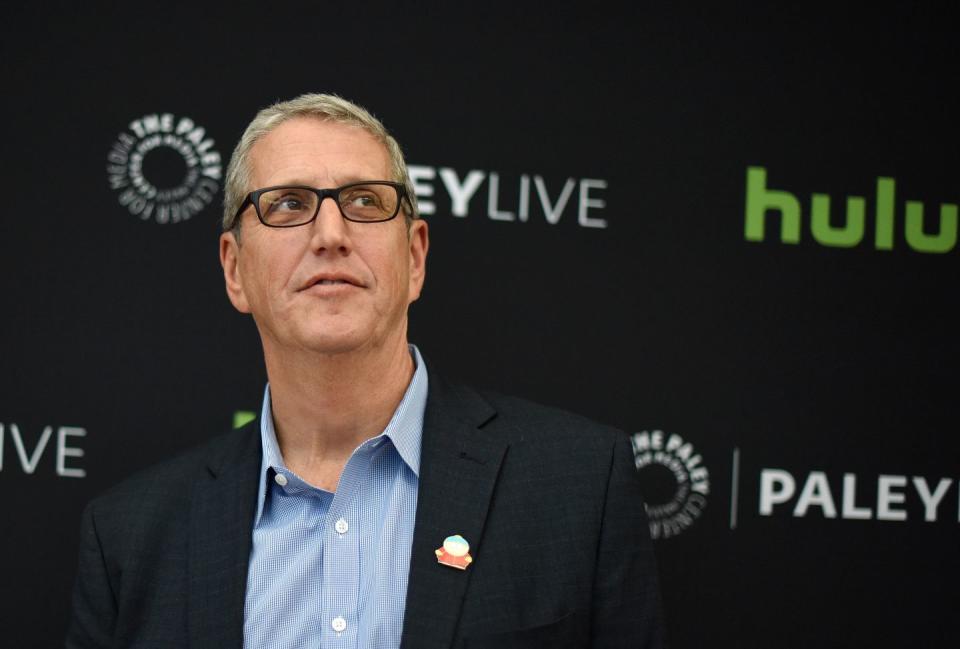
Even if we hadn't checked in with MTV News for a while, just knowing it was there was a comfort.
Yeah, and I think a lot of us forgot that it was there. Even those who were there forgot it was there. I'd say no one watches MTV anymore, certainly not on the linear channel.
Right.
So I guess MTV News survived as a digital brand for a bit.
You were instrumental in the foundation of MTV News. What was your role at the beginning?
MTV was launched in 1981, and they had two guys who ostensibly looked after news, basically ripping stories out of Billboard, taking the occasional call from a record company publicist, and turning that into little news blurbs that the VJs could read. When I got there in 1984, I was given the title of News Director, and a little bit of a budget to start a proper news department. We’d go out and shoot stories in the field, at concerts and recording studios. Wherever there were parties, basically.
But the big turning point came with Live Aid in 1985. The MTV News team was filing reports from backstage and turning them around quickly—coming out of that, there was a sea change. MTV News was suddenly something to look at and pay attention to. And a couple years later, as we continued to evolve, a woman named Linda Corradina, who was running MTV News for me day to day, came up with this idea of hiring Kurt Loder.
What we were finding in the news department was that when we reached out to artists, the big ones were less interested in sitting down with VJs. They wanted someone a little more credible. So we looked across the street at Rolling Stone, where Kurt was this amazing writer. Kurt is somebody that Bruce Springsteen or Madonna or Prince or George Michael would be a little more comfortable sitting down with.
He was probably in his forties at the time. We were all in our twenties, so he was this great sage. Kurt is and was much older than he looks. I think he's 78 today.
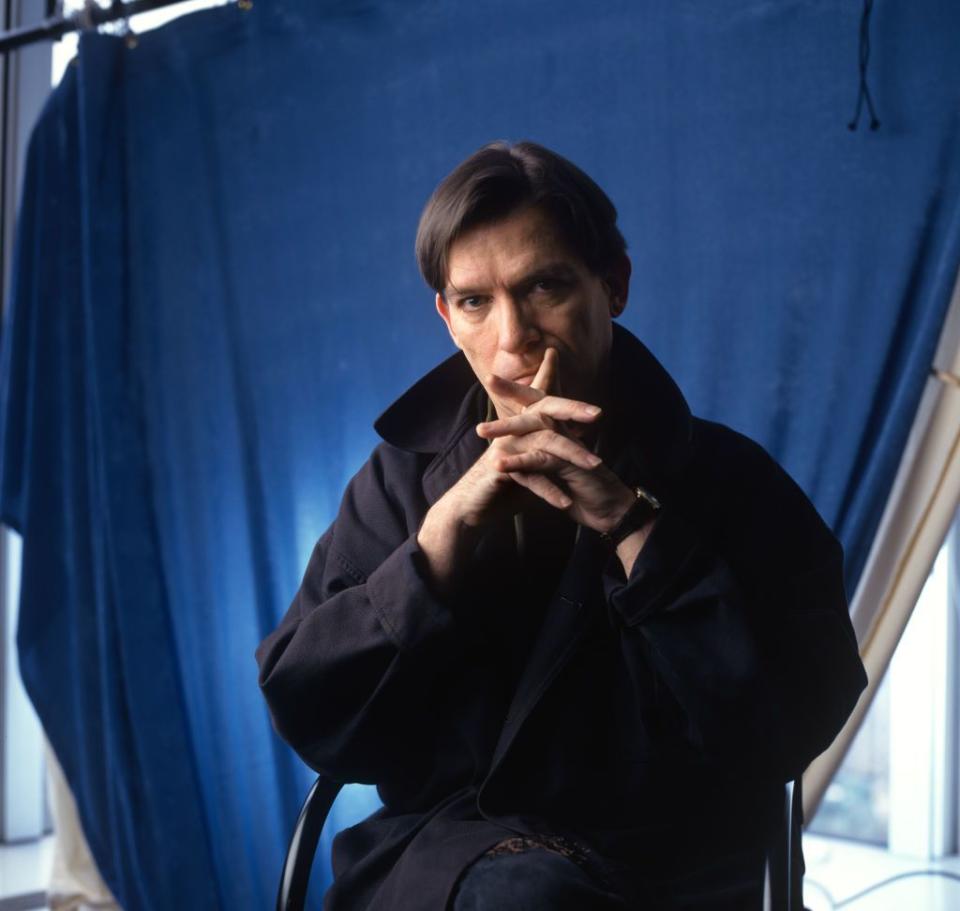
Kurt was the perfect person for that job, because you needed the VJs to be enthusiastic and peppy, like "This is the greatest." But you also kind of needed somebody to balance it with like, "Eh, seen better."
And then shortly after he came on, we created The Week in Rock, and he became the Walter Cronkite of MTV News.
I remember that as the turning point, when MTV began to shift away from non-stop music videos.
It was part of an evolution of MTV. Distribution was growing, ratings were growing, advertisers were getting interested, and we needed a way to keep viewers around longer. To make sure that they didn't change the channel after the Culture Club video that they liked, because then it was a Bryan Adams video they didn't like. We didn't call it engagement then, but that's what it was about: keeping people around longer.
Bob Pittman, who was running MTV, decided we needed to do long-form shows. Now, that was heresy at the time, at least people in the building thought so. I was the guy charged with creating these shows. Bob wanted a game show, which ultimately became Remote Control. He wanted a dance show, which ultimately became Club MTV. And because we had a news department, he thought we should just gather up all the news we were doing and wrap it into a weekend news show. That's how we got The Week in Rock.
And then MTV News really started to evolve. We started doing more stories and more coverage, and I think the news breaks went from once an hour to twice an hour. It became a thing, a really important part of the programming, and not just a throwaway or an afterthought. Then we started doing documentaries and winning awards.
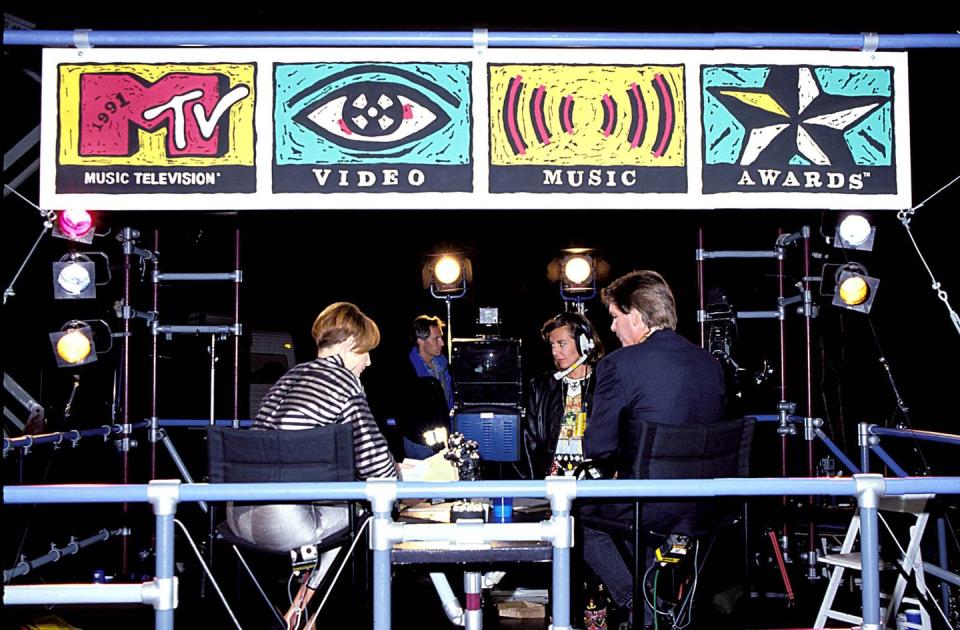
What was the first big award for MTV News?
I think I've got a couple of Peabody Awards sitting in a closet somewhere. In those days, there weren't a lot of awards to give, honestly. We weren't really eligible for the Emmys in those days, but there was something called the CableACE Awards, which I don't think we ever won.
Who wants one of those anyway? It was a doorstop they glued glitter on.
We were always the bridesmaid of the CableACE Awards. Looking back on it now, I’m kind of fascinated with how frustrated we were. “My God, why can’t we win a CableACE Award?”
Kurt is a really significant figure, I think. Of course a kid watching MTV would want to be a VJ, to be able to go to all the parties and shows and talk to the celebrities and all that. But you watched Kurt Loder, and it was like, "Oh, you can actually build a career out of this, and do something with some thoughtfulness and gravitas."
I'm not sure anybody thought that was possible before Kurt. He became, to a certain degree, the face of the whole thing, the center. But there were other great people like John Norris, Alison Stewart, who is still on the radio every day at WNYC in New York.
Another big thing we were able to do was report on and talk about music that the network wasn't necessarily playing. Bands like The Replacements or R.E.M., who in those days were a little bit on the fringes. There was a cool factor that MTV News brought to the party. And then we got into reporting about fashion and sports and movies.
You know, it's hard to remember what a giant cultural force MTV was in those days. It was Spotify and Snapchat and Instagram and TikTok all rolled into one, and everybody wanted to be on it. Everybody wanted to touch it. And that included future President of the United States Bill Clinton, as we started to dip our toe in the politics around Rock the Vote and then the Choose or Lose campaign.
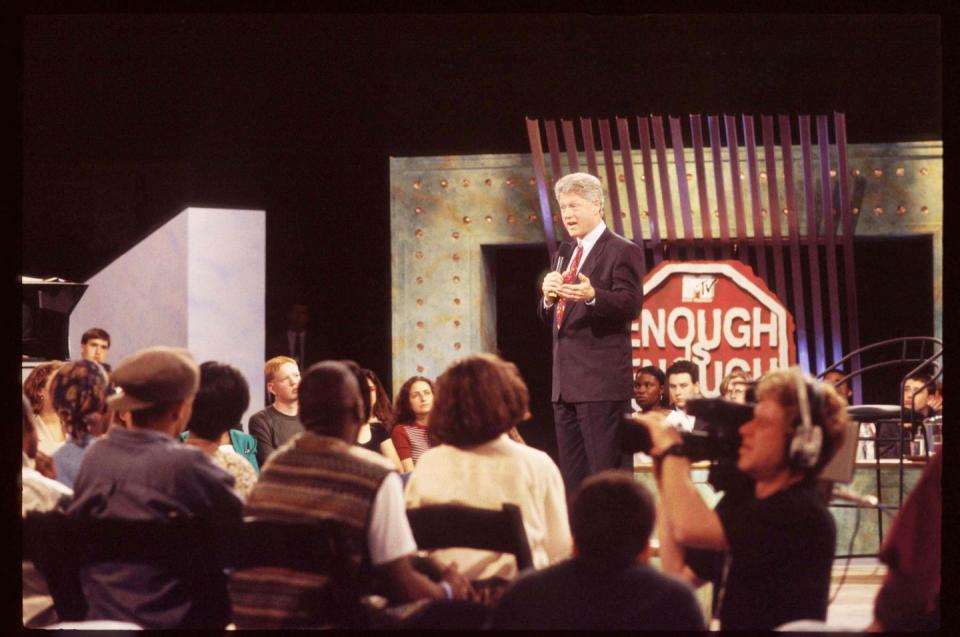
It's striking to me that before Choose or Lose, the idea that a presidential campaign could be made, and should be made accessible and interesting to people under the age of 50 had not occurred to anyone.
Well, nobody had the idea to do anything for young people. That was the brilliance of MTV. It was a television network aimed at young adults, and that just hadn't been done before.
But honestly, for the idea of doing political stuff, I credit my colleague and then later my boss, Judy McGrath. She saw that opportunity to talk to kids about that stuff and to report on it a little bit. It started through this Get Out and Vote campaign, but then we thought, "If we're telling them to get out and vote, we should tell them what they're voting about." And for MTV, a network that was built on rock n' roll and spandex and long hair and girls in skimpy clothes, all of a sudden the idea of sitting down with Bill Clinton or George Bush became a real thing. Tabitha Soren and the second generation of MTV News, led by Linda Corradina and a guy named Dave Sirulnick, they did an amazing job covering all that stuff.
And as they took politics, which had traditionally been a little weighty and boring, and made it accessible for younger people, they also kind of did the reverse: with Sex in the 90s, and later, Spring Break Uncensored, it felt like MTV News was able to show the more interesting and nuanced side of literally Spring Break.
Well, yeah. As we got into the '90s, MTV turned the camera around onto its audience with The Real World, and to a certain degree, in terms of traditional television, we’ve changed everything, right? MTV was ground zero for unscripted and reality TV, but MTV News did the same thing. It wasn't just about reporting on stars and musicians, it became about reporting our audience and who they were, and what they were, and what they were thinking about. So whether it was drugs, mental health, religion, whatever it was, MTV News was ready to dive in.
I think also MTV News benefited from the fact that we were in the time of the monoculture. There was one river from which all content flowed, and MTV and MTV News was it.
Yeah, it was it. There was nowhere else to go. Certainly on television, nobody was doing anything close to it. There was Rolling Stone, there was Spin, and we looked at them as our competitors. But we did something very different in a very different way on a very different platform than they did. But, yeah, we were the only show in town for a long time.
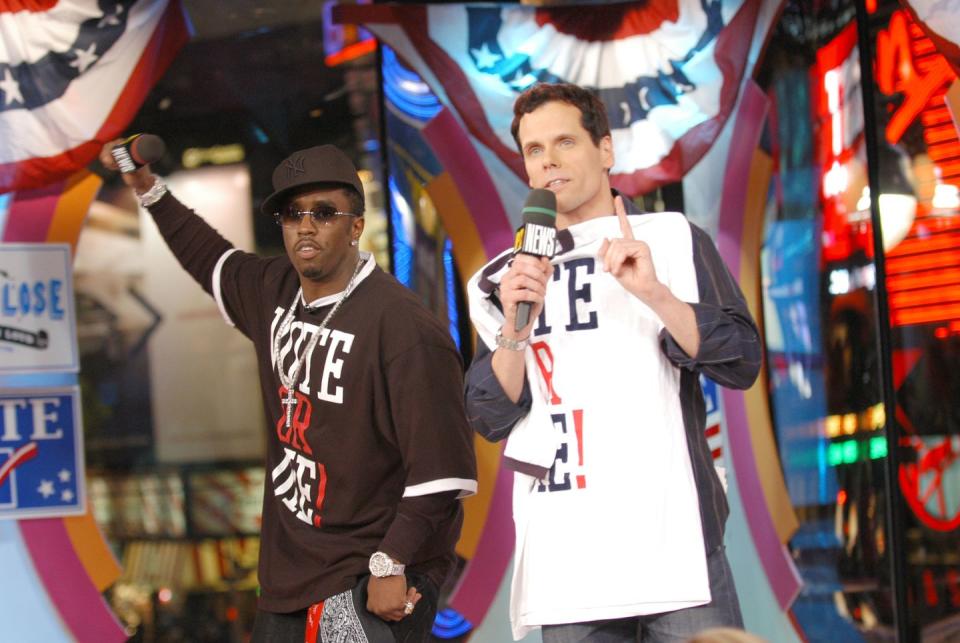
When you heard that the plug had been pulled on MTV News, was there a memory that popped into your head?
When the news broke, immediately people started reaching out from all over the MTV map, as it were. I heard from a lot of people from those very early days, when we first had our own newsroom. It was a terrific and unique group of people, a band of music-news misfits, and we just had a great time building it as we went along. That was the beauty of MTV in those days: it was new, it was growing, we were making it up. There was no rule book.
But Live Aid always stands out to me as the turning point for MTV News. By the way, it was a turning point for MTV in general. It was a real milestone. MTV was moving out of what I call the great classic music video era: Born in The U.S.A. and Purple Rain and The Jacksons' Victory Tour and Madonna. I refer to all that as the Mount Rushmore of music video. But around the time of Live Aid, the page is being turned and MTV is moving into its second phase, which included original programming and news. It was a step up into maturity as the whole world was watching.
And now it's a million outlets chasing ever smaller audiences. Is there any brand right now that's doing a good job of what MTV News did in the ‘80s and ‘90s?
God! I'm not sure there is. I mean, I think digitally there's a lot of folks out there. And as we know, some have recently gone away. But like I said, it's very tough to go back 35 years or whatever, and remember what MTV meant in the culture, particularly to young people. There was no precedent for it, and there's nothing like it today. I mean, look, everything evolves. The fact that MTV is no longer going to be what it used to be was going to happen anyway. It's not necessarily MTV's fault.
But overall, now that it’s over, I will say this: It really was as much fun as it looked like. I can say that for sure.
You Might Also Like

